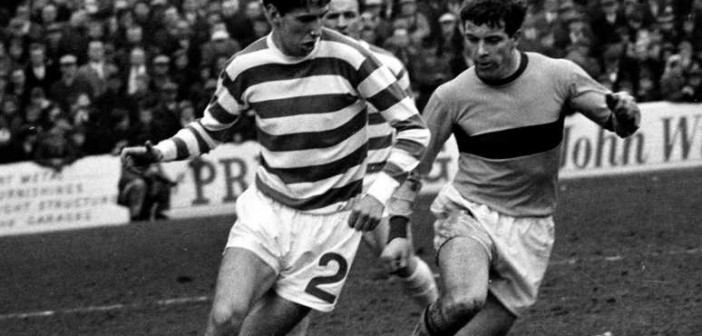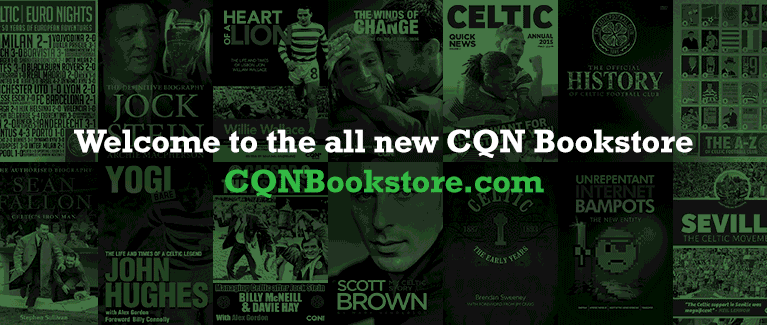JIM CRAIG will become the latest Lisbon Lion to sign up to CQN for a Q & A session with Celtic supporters. This will happen this evening (Wednesday November 18 from 7.30pm. Jim will be accompanied by Brendan Sweeney who has just published CELTIC THE EARLY YEARS. Jim wrote the foreword for this unique Celtic book and is works closely with Brendan on Celtic Graves.
Willie Wallace, Tommy Gemmell, John Hughes and Bertie Auld have all come onto Celtic Quick News in recent times and all of them have loved the experience. If you have a question for Jim or Brendan just post on CQN from 7.30pm tonight and you’ll get an answer. If you aren’t signed up to CQN you can join now.
Meanwhile we thought we’d feature Jim this afternoon and Alex Gordon kindly gave us permission to re-publish the chapter he wrote with Jim back in 2007 to mark the 40th Anniversary of Celtic’s greatest day in Lisbon. So here’s what Jim was saying about Lisbon back in 2007…
I FULLY admit to making life difficult for Jock Stein. I am also sure he found me a bit awkward. Either way, it made sure life as a Lisbon Lion was never dull.
Right from the start, Big Jock could never get his head round the fact that I had a job outside football. I was a qualified dentist – surely the only one who has ever won a European Cup medal! – and he wasn’t prepared to accept that I could concentrate 100 per cent on being a footballer while I had outside interests. I told him many times that I could, indeed, do both jobs equally well, but he was never convinced. It would be fair to say we had a few run-ins during our time together.
Don’t get me wrong. Big Jock was a very talented man. An exceptional, ground-breaking manager. Football to him was everything and if he thought you weren’t eating, drinking, sleeping football, too, he believed there was something wrong with you. You got the impression you should park your brain at the door outside Celtic Park and pick it up on your way home. I had other interests, but I would defy anyone to say I wasn’t committed to the Celtic cause. When I pulled on that green and white shirt I was as ready to go as anyone. Jock and I had a problem, though, because of our differing attitudes. I’ll admit I could be deliberately destructive. I had an inquistive mind – still do, I hope – and I would ask questions. This was something that was new to Big Jock and something he didn’t embrace with any enthusiasm, believe me.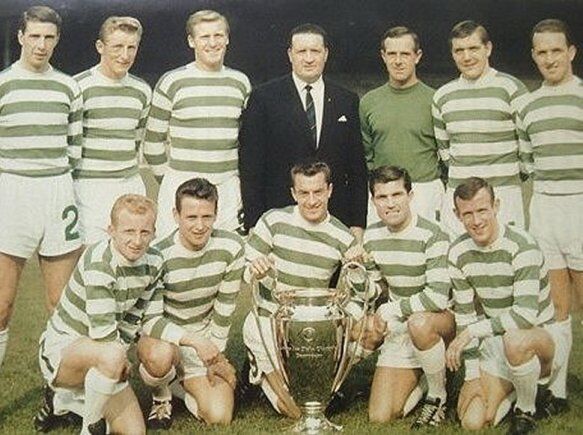

I was the guy who would query this, that and the next thing while most of my colleagues bit their tongues and kept quiet. He would point to the tactics board and go through a lengthy routine. Some of us took it in and others didn’t. How could you tell Jimmy Johnstone how to play? I would ask a few questions, make a point or two and Big Jock, plainly, didn’t welcome such intrusions. He was a meticulous planner; probably the first of his kind. He would go through our line-up and tell us exactly what he expected us to do. He rarely dwelt on the opposition. He concentrated mainly on us and what we should do on the day. I thought it was only right and proper that I should ask a question or two just to clear up any possible misunderstanding. If Plan A wasn’t working, what was Plan B? Jock didn’t like that. He was a big fan of the master/servant relationship and, naturally, I didn’t agree with that mode of thinking. For a start, I was halfway through my dental studies and that’s a job where, quite literally, you have to think on your feet. You have to make decisions very quickly. You are very much your own man. So, I have to admit when I turned up at Celtic Park and found I didn’t have a mind of my own, it was extremely difficult to accept. Big Jock would wave you away with that big left hand of his. “Oh, just do as you’re told,” he would say. Okay, he was the boss, but that didn’t mean I had to touch my forelock every time I spoke to him. In fact, I was never a massive admirer of authority figures. I’m afraid that still applies!
But I was a seeker of knowledge and I don’t think that is a bad thing. I wanted to know what was going on inside Big Jock’s head. I’ll also admit that I did sometimes go over the score and I’m sure he knew it. For instance, there was one particular day when the boss was going through his usual routine before a big match. We were all taking it in, listening to his instructions, but I noticed one individual who looked as though he couldn’t give a stuff. When Big Jock was pointing to the blackboard, this guy was looking at the ceiling, clearly totally unimpressed by proceedings. I won’t name the player, but, suffice to say, he was never a great believer in tactics and such like. He played totally off the cuff and that’s what made him such an entrancing, exciting individual. Football, to him, was completely instinctive. You could say he was a free spirit. I guess you’ll have worked out by now who I am talking about!
At the end of this talk-in I had, as usual, a few questions to put to the manager. Again I was waved away. “Just do as you’re told”, I was instructed for the umpteenth time. However, as we were filtering out of the room, Big Jock got a hold of me and pulled me back in. “Okay, what is it now?” he asked. I told him I knew what I was supposed to do, but did everyone else take in what he was saying? He knew what I was talking about okay and he just laughed. I reckon he, too, realised there was little you could do with this player. You could hammer all sorts of instructions into him, but he would just go out and do his own thing, anyway. And he did it very well, too, I hasten to add.
Big Jock, as everyone knows, was a huge admirer of attacking football. He always believed in entertaining the punter. We could be three goals ahead, but he would demand four. If we were four in front, he would look for five. Ironically, as a player, he was a centre-half who rarely ventured across the halfway line. As a manager, though, he liked nothing better than his team playing with flair and adventure. I suppose his philosophy was that attack was the best form of defence. No team was going to score from their own half, after all. However, Big Jock wasn’t against letting the opposition know you were on the field. If he thought you were up against a particularly dangerous individual he actively encouraged you to “lean on him”. That was a euphemism for giving him a wee dunt just to see how his heart stood up to it. You would be amazed at the amount of players who disappeared off the radar after a fairly solid challenge. I don’t think you could ever categorise me as a dirty player, but I can now admit that I could put it about with the best of them.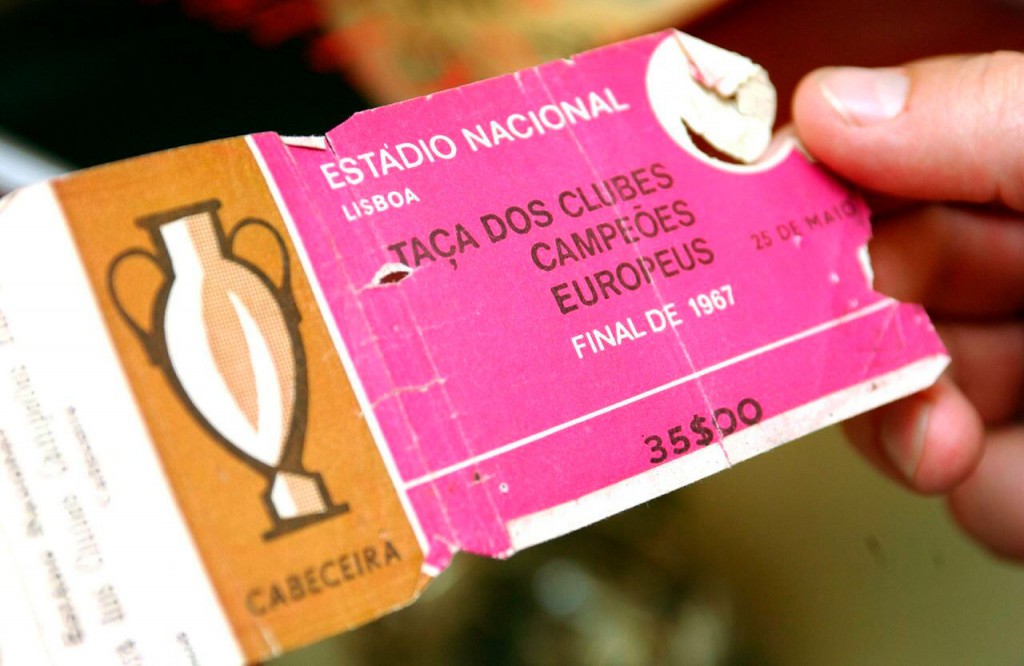

Not that long ago, they were showing the Jimmy Johnstone film at a theatre in Glasgow when yours truly appeared on the screen with what looked like a fairly vicious tackle on an opponent. Well, I almost separated the guy’s torso from his legs and there was a sharp intake of breath among the audience. To say I was just a tad startled would be putting it mildly. I could hardly believe I was the guy up on that film who had made such a crude challenge. Yes, I was a bit embarrassed, but, anyone who watched me in action back then would say that wasn’t typical of Jim Craig. I hope so, anyway.
People have often approached me to say they thought I was the quiet man in the Lisbon Lions line-up and I would accept that was a fair assumption. I’m not a particularly noisy character and in a busy dressing room it was never easy to get a word in edgeways, anyway, with guys such as Tommy Gemmell and Bertie Auld around. I preferred to do my talking when you could actually be heard although, as I have already stated, Big Jock probably would have been a lot happier if I had kept my trap shut from day one!
I didn’t go overboard in my protestations when the referee awarded Inter Milan a penalty-kick in Lisbon after my tackle on Renato Cappellini. What would have been the point? The referee was hardly likely to change his decision once he had pointed to the spot. Let me say here and now, though, that it was never a penalty-kick. Absolutely no way. It doesn’t matter now, of course, but I still hold the belief that the referee got it totally wrong. Folk have said I tackled with the wrong foot. Others have said I should have tried to play the Inter Milan centre-forward offside. Everyone is welcome to his or her opinion, but, 40 years down the road, I am as convinced as I was back then that it was no penalty-kick. Cappellini was a big bloke, but he went down like a sack of tatties when I challenged him. Of course, he was looking for a penalty and the referee didn’t disappoint him. He couldn’t wait to point to the spot. I’ve lost count of the times I have replayed that incident in my mind and I always come to the same conclusion – the referee made a bad call.
You could say that I helped to make a game of it! How would the remaining 83 minutes have panned out if Inter Milan hadn’t got that penalty-kick? Who knows? But it certainly handed the impetus to Celtic and we knew exactly what we had to do in an effort to turn things around. I think we achieved our goal fairly well. One interested spectator that day as the Estadio Nacional was my Dad. He was a manager in the furniture department of Glasgow South’s Co-op and, as a result of this, he worked on a Saturday and could only get to midweek matches. However, he really floored me by saying that he did not want to go to Lisbon. I couldn’t believe my ears and asked him why. He was quite honest about it. He said he thought Inter Milan would be too strong for us and he did not want to go over there and see us being beaten. I accepted that, but, just in case he changed his mind, I held a ticket for him and booked a seat on the plane. As the days passed, I worked hard on Dad, but he only changed his mind at the last minute. However, I had the ticket and the seat all ready, so off he went on the great adventure.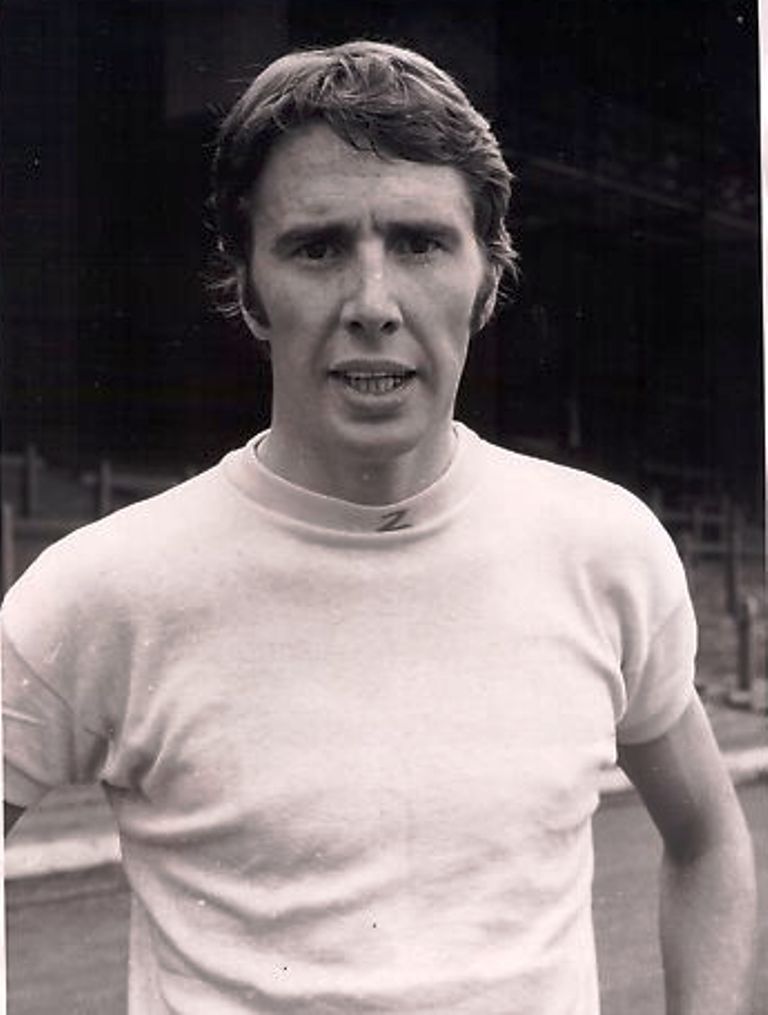

Dad couldn’t have been too happy when I was involved in the penalty incident, that’s for sure. I had been assured that Cappellini was, in fact, all left foot, so when he ran in on goal from the right hand side, I assumed that at some point he would want to put the ball to his stronger foot. I decided that I would block any attempt to do so, but when the challenge came, he went down rather like an ageing actor and I believe the referee was completely conned by it. A question I am often asked is: “What does a player think about in a time like that?” Well, in my case, I can assure you that my thoughts were with my Dad up in his seat. I had spent time persuading him to come over against his better judgement and now he had to sit through it all.
Dad told me afterwards: “I didn’t think it was a penalty-kick, to be quite honest, because the Italian player wasn’t going towards goal and I think he had over-run the ball. Probably, the referee was as nervous as the players and over-reacted. What worried me more was that might be the only goal of the game and my son would get the blame for the defeat. In retrospect, it probably helped a lot because the Italians just fell back into defence and Celtic were allowed to take control.”
Actually, I still laugh at the recollection of Big Jock at half-time. Of course, we were all disappointed to be 1-0 down despite bossing the first-half after that goal. I wasn’t too enamoured by the fact that I had been adjudged to have given away the penalty-kick. Jock came over, threw an arm around me and said: “Don’t worry, Cairney, that was never a penalty. Never in a million years. Don’t worry. Don’t blame yourself. Put it behind you. Show them what you can do in the second-half.”
At the end of the game, though, Big Jock sidled up to me and said: “What on earth were you thinking about at the penalty? What a stupid challenge. You almost cost us the European Cup with that daft tackle.” Thanks, boss! That was so typical of Big Jock, though. He knew the right buttons to push at the right time. That was part of his make-up and I suppose that’s what made him so special. He could have taken me apart at half-time, but that would hardly have done my morale or confidence any good. He waited until that silverware was heading for the Celtic Park trophy cabinet before he told me what he really thought. I still don’t believe it was a penalty, though. And, at least, I had the satisfaction of laying on the equalising goal for Tommy Gemmell. In fact, if you are going to talk about penalties, can I mention the one we didn’t get when their excellent goalkeeper Guiliano Sarti hauled down Willie Wallace in the second-half? Sarti actually grabbed Wispy’s leg and pulled him to the ground as he was about to roll the ball into a gaping and inviting net. It was like something out of WWF, but, on this occasion, the match official, a certain Herr Kurt Tsenscher, was not impressed and waved play on. Yes, it was an injustice, but it simply made us all the more determined to win that match. Nothing was going to prevent us. Nothing or no-one.
I was on £30-per-week back then. I think I was the poorest paid player of the Lisbon Lions. The rest, I believed, were picking up £40-per-week with Billy McNeill getting an extra £10 for being captain. That meant a difference of £20 between me and Big Billy and, believe me, that was one helluva differential. You know, I can’t remember how I spent my £1,500 bounus for winning the European Cup. I know some of my colleagues bought cars, put down deposits on houses, went on luxurious holidays. Me? Can’t remember, but I do know I would have enjoyed spending it. If you are earning £30-per-week then you are bound to go just a little bit crazy when you suddenly pick up something in the region of a year’s wages. I was rich beyond my wildest dreams!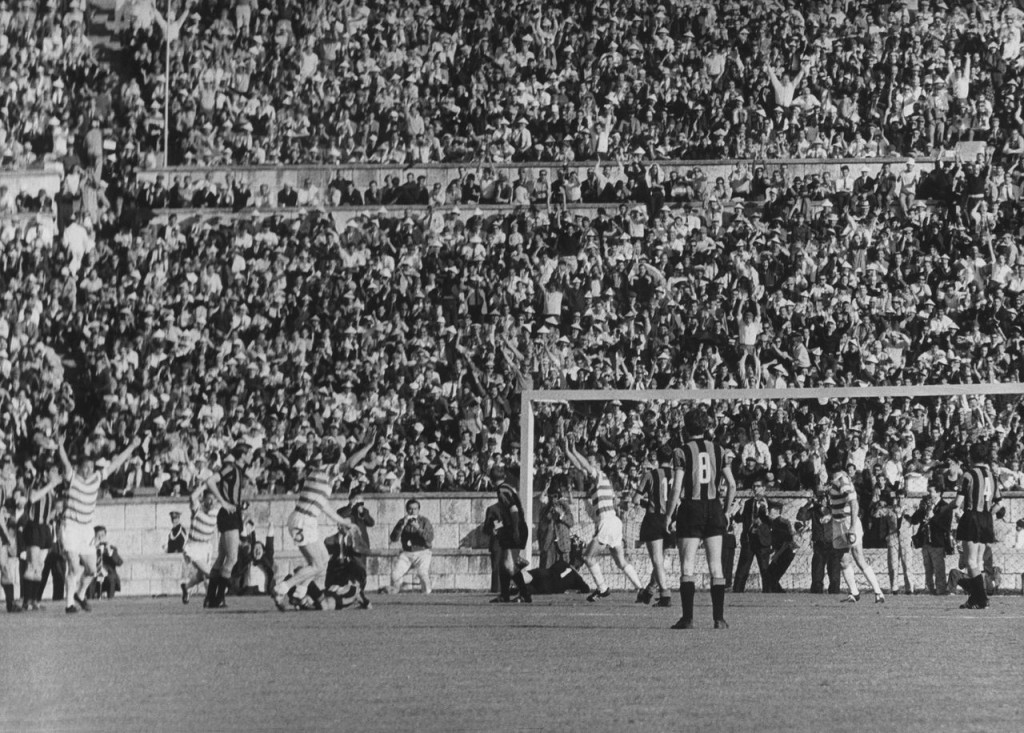

Getting to Lisbon, of course, was a wonderful journey. It was a huge learning curve and just one superb experience. You have to say we thoroughly merited our European triumph – just take a look at the sides we had to overcome on our way to the final. They were all top quality. Those were the days when you actually played the champions of their country. It really was the European Champions Cup. Nowadays you can get teams winning Europe’s premier trophy when they aren’t even the champions of their own nation. Something odd there, I think. We opened by playing FC Zurich and it would be fair to say Switzerland was a strong footballing nation at that point. For instance, the Swiss played in the World Cup Finals the previous year in England. Remember, too, there were only 16 countries competing for the trophy back then unlike today where there seems to be a cast of thousands, a real Cecil B de Mille job with all the extras. Then we took on Nantes and France, too, had made it to the World Cup Finals in 1966. Then it was onto Vojvodina Novi Sad and they were by far the most superior team we faced in Europe that season. It tells you everything when you note they were champions of Yugoslavia when Partizan Belgrade had played against Real Madrid and lost narrowly 2-1 in the European Cup Final the previous year. Dukla Prague were the biggest team in Czechoslovakia and, of course, that country had played Brazil in the World Cup Final in Chile in 1962 and, like the others, had a strong footballing pedigree. These were also the days before the influx of so many foreign players plying their trade in different countries from their birthplace. So, how the nations performed on the international stage was fairly indicative of how healthy their club competition was at home. Playing teams from Switzerland, France, Yugoslavia, Czechoslovakia and then Italy underlines Celtic’s achievement in 1967. It was no easy ride, take it from me. We earned everything we got.
We faced a lot of excellent individual players, too. The guy who gave me most bother was Vojvodina’s Stanic, who got their goal in the first leg in Novi Sad. He was skilful and tricky, but I remembered Big Jock’s words: “Lean on him and see if he has a heart that size of a pea”. So, dutifully, I “leaned” on Stanic at one point. Lo and behold, he suddenly thought it was a better idea to go and play somewhere else on the field. Problem solved. Vojvodina were a fabulous team, though. They played in a typical, controlled Eastern European fashion and were superb at keeping possession. You can run for miles with the ball at your feet, but it’s not so easy when you are chasing around trying to get it back. That can be exhausting and the Slavs put a lot of emphasis on retaining possession. We may have lost that game 1-0, but we weren’t disheartened. Simply put, we believed we could overturn their advantage in Glasgow. And so it proved, but we did leave it a bit late, didn’t we?
I thought we played well that night and, unfortunately for yours truly, I was next to Big Jock in the dug-out on the right touchline throughout a dramatic second-half that was fraught with anxiety. All I could hear above the din of almost 70,000 fans was “Cairney, do this” or “Cairney, do that”. It wasn’t easy playing right-back when Big Jock was in full flow. I used to look round every now and again and shout: “Why don’t you have a go at Bobby or wee Jinky?” Luckily for them, they were probably out of earshot and were spared the verbal volleys from the manager. Big Jock would also yell at you to pass on instructions. Aye, right! I simply concentrated on my own game – that was enough for going on with.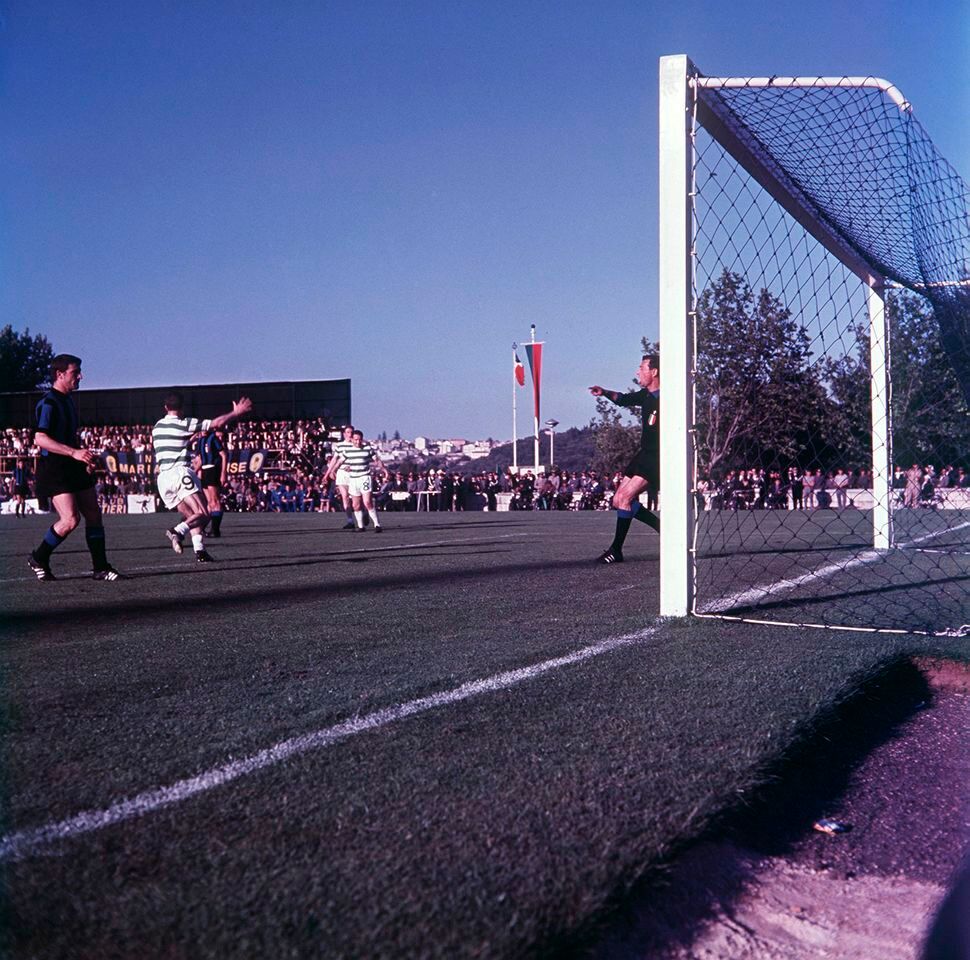

Looking back on that so special day in Lisbon I have to chuckle at how different it was from the day I made my Celtic first team debut. I remember it well. It was on October 7, 1965 against Dutch side Go Ahead Deventer in the European Cup Winners’ Cup at Celtic Park. Big Jock, as thoughtful as ever, had a habit of selecting games in which younger players could get a chance without too much pressure on them and he chose well with this one – Celtic were 6-0 ahead from the first leg in Holland! Bobby Lennox, with a hat-trick, Jimmy Johnstone, with two, and a single from John Hughes made certain Celtic would be in the next round. The evening before the home tie I was told I would be playing. I was 22-years-old at the time and still doing my dentistry studies while playing part-time. Excited? You can bet on it. I will always recall waiting for a bus in Argyle Street among a pile of Celtic supporters to take me to the east end of Glasgow. I was sitting among these guys and they were talking about who might be playing for Celtic that night. No-one took a blind bit of notice of me. I was totally unknown. I felt like telling them I would be turning out at right-back for their favourite team, but they probably wouldn’t have believed me. A Celtic player on a bus? Just an hour or so away from kick-off? Don’t be daft!
However, I did indeed make my first appearance in those famous hoops and a single goal from Joe McBride gave us a rather emphatic 7-0 aggregate triumph. I would like to say I played my part in that victory! I must have impressed Big Jock – I was promptly put back in the reserves with Ian Young returning to the No.2 berth for the next game, a 5-2 win over Hearts. However, I came back on November 13 in a 4-1 win over St.Johnstone and played another 13 first team games after that. Big Jock might not have given it his blessing, but I was coping well enough with combining my studies with my football. Actually, I might have missed out on Lisbon entirely because I wasn’t involved in the opening four games against FC Zurich and Nantes, home and away. Tommy Gemmell was at right-back with Willie O’Neill at left-back. I could hardly complain because I had missed out on the team’s summer trip to the States because I had dentistry exams at the same time. So, I sat out that tour as the team bonded. They played 11 games, won eight and drew three. They scored a remarkable 47 goals in the process with Bobby Lennox claiming 19 of them. They played a strong Spurs team three times, beat them twice and drew the other. They also drew with Bayern Munich and Bologna. They did come up against some inferior opposition, too, and they walloped a Bermuda Select 10-1, a Hamilton Select 11-0 and St.Louis All-Stars 6-1. So, it was a worthwhile exercise altogether, but, unfortunately, I had to miss out.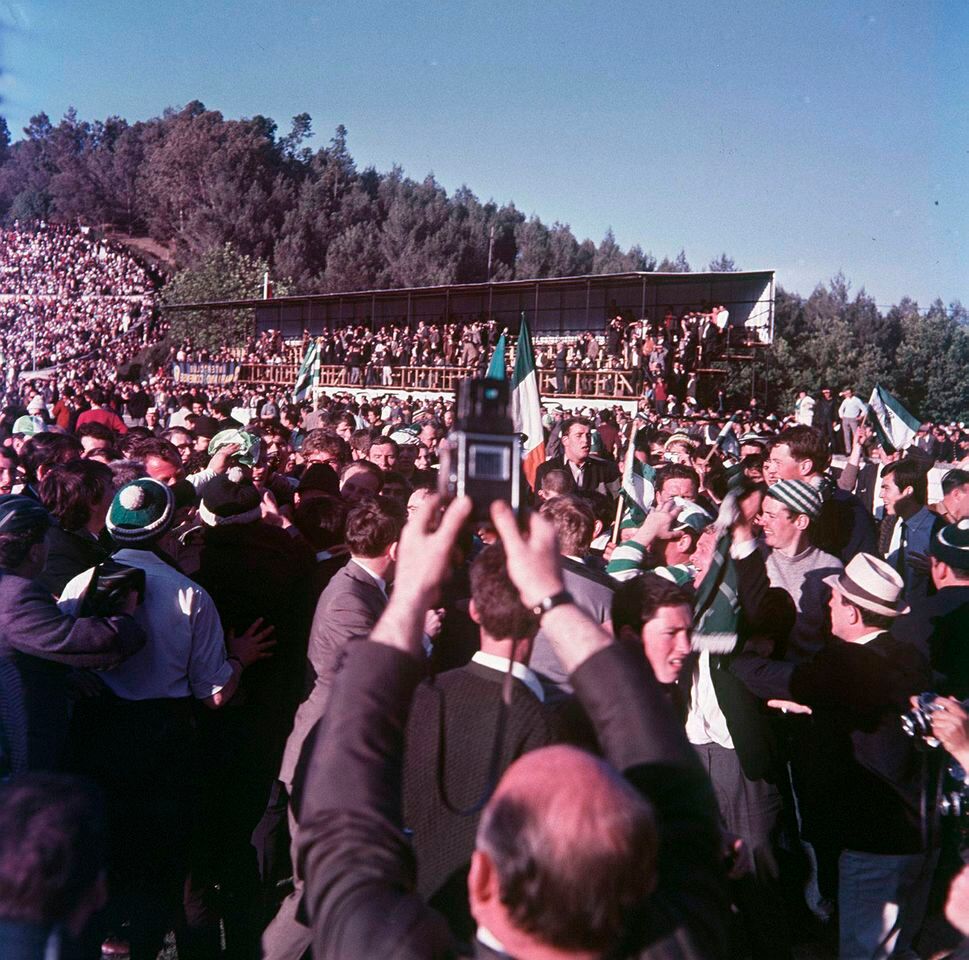

Big Jock started the 1966/67 campaign with Tommy Gemmell in the right-back berth and he played the first five league games before Ian Young came in for the 3-0 win over Airdrie on October 15. Remarkably, that was Ian’s only league outing that season. I came in for the 1-1 draw with St.Mirren on November 5 at Parkhead after Tommy moved from his usual berth to take over at centre-half for the injured Billy McNeill. Sadly, there were no fireworks from Celtic that afternoon, but I do recall Dennis Connaghan having a very good game in goal for the Paisley outfit. He eventually joined up at Celtic five years later. After the Saints game, I dropped out with big Tommy switching back from central defence with Billy fit again. I got the nod once more, though, on January 7, 1967 in a 5-1 victory over Dundee at Parkhead and, apart from a 3-2 triumph over Dunfermline on March 18, I played in every other league game. As far as Europe was concerned, Big Jock changed things around when he put Tommy over to the left and went for me on the other flank for the matches against Vojvodina and I stayed there all the way to Lisbon. It made a lot of sense for Tommy to play at left-back despite the fact he was mainly right-footed.
Coming in from the left on his favoured foot often gave Tommy the opportunity to have a go at goal. Playing on the right, he would probably pass the ball inside to the likes of Bobby Murdoch to have a pop. He was in his element, though, on the left and, of course, scored some spectacular goals for the club. In fact, just about every outside player chipped in with goals with the exception of John Clark who was our defensive rock. His nickname was Luggy, but he was also known as The Brush to the fans. He would sweep up deep in our own half and he did it so very well. His concentration never wavered and he was absolutely brilliant at reading play coming towards him. He rarely got the headlines, but that didn’t bother him as he put in solid displays on a match-by-match basis. A great team man.
I don’t suppose I was your typical right-back way back then. A lot of full-backs were merely that. They didn’t display much enthusiasm for getting across the halfway line. They were defenders first and foremost. The forwards could get on with their job of plonking the ball in the opposition’s net. However, similarly to Tommy Gemmell over on the left, I liked to get forward and join up with the attack. Tommy often described me as an athlete and I took that as a compliment. Yes, I was exceptionally fit during my playing days and I also took care of myself. I never dived into tackles, either. I am 6ft 1in tall and there was a long way to get back up if I mistimed a tackle and the forward got away from me. I preferred to jockey my opponent and make my move when I was absolutely certain the timing was spot on.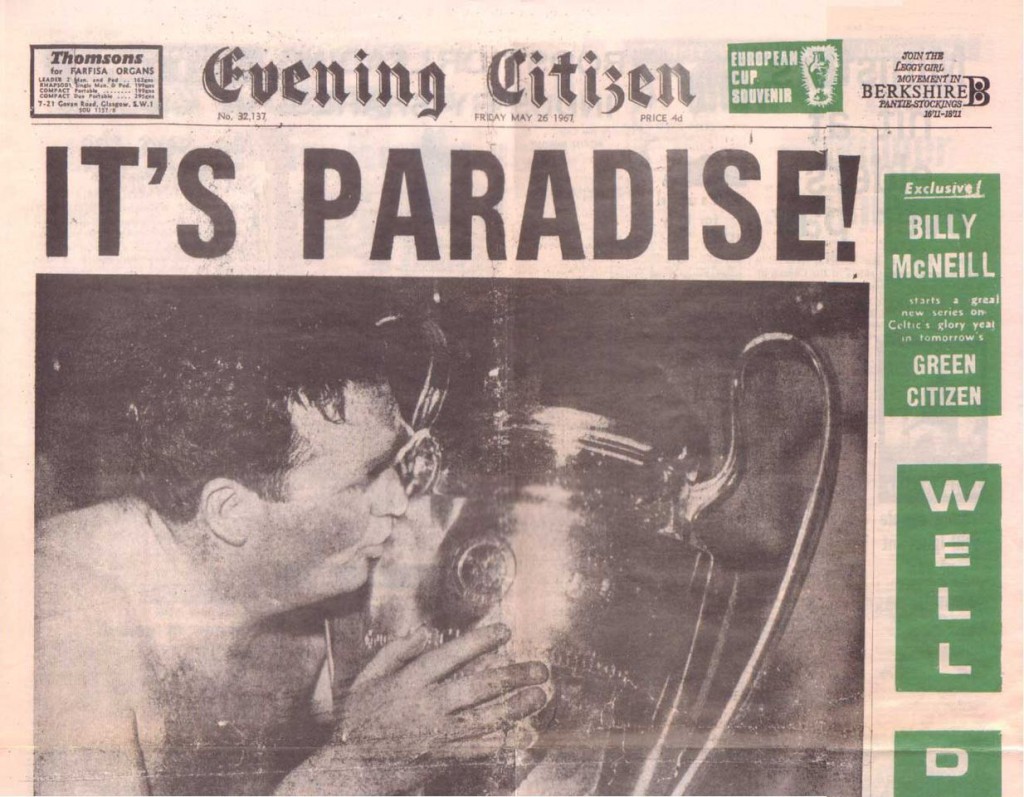

The guys in front of me most of the time on the right hand side of the team were Bobby Murdoch and Jimmy Johnstone. Bobby, of course, could slice open any rearguard with one of his searching, probing passes. He was the master at unlocking defences. Like Tommy, he could also score from long-range with his excellent shooting prowess. His natural desire was to go forward. Jimmy Johnstone was in front of me, too, as our natural outside-right and we all know about his immense talent. But the wee man was never going to become famous for his ability to track back. Actually, if Jinky put his mind to it, he could tackle with the best of them. It was just about getting his mindset right on the day. Jinky may have only been 5ft 4in, but he was incredibly well built. He had huge shoulders and good upper-body strength. Big defenders who thought they could scare off the wee man had that notion swiftly knocked out of them. He was so brave, too. I’ve said it often enough and no doubt I will repeat it. Folk talk of Jinky’s outstanding talents, but they often overlook the sheer bravery of the player. It takes a man with a big heart to continually get bowled over and keep getting back to his feet knowing some of the same was waiting for him. Some players would go and hide, simply disappear into an air pocket somewhere, but not Jinky. He just kept on running at defenders and was completely fearless. Have a look at his display against Atletico Madrid in a European Cup-tie at Celtic Park back in 1974. The Spaniards had three players sent off and ended up with eight men after one of the most brutal games in memory. They hacked Jinky to pieces and his legs were scarred and black and blue afterwards. Not once, though, did he complain. He just kept on going and underlined what we all already knew – nothing on a football field frightened him.
You couldn’t help but love the wee man, but he was a bit of a scamp at times. We used Seamill as our HQ quite a lot back in the Sixties and Seventies as we prepared for big games and a lot of us fancied ourselves as budding Jack Nicklauses and Arnold Palmers. We took our golf clubs with us to help us relax. Jinky, though, wasn’t interested in getting the sticks out and he would often hide behind a bush or a tree when we were playing. You would look quite pleased with yourself when you hit a good, direct shot down the fairway from the tee. While you were congratulating yourself on a reasonable effort, a wee ginger-haired figure would suddenly flash into vision, pick up the ball and throw it into the rough or, even worse, a bunker. I never could see the funny side of that!
I’ve often been asked who I thought was Celtic’s Man of the Match in Lisbon. Wee Jinky? Bertie Auld? Bobby Murdoch? Modestly, I believe the two full-backs, myself and Big Tommy, did rather well. Seriously, though, it was all down to team work. We had some smashing individuals, but Lisbon on May 25, 1967 was a time and place for all of us to stand up and be counted. No-one shirked his responsibility and we won as a team. However, I don’t think Jinky ever received the credit he deserved for his performance that day. He didn’t seem to be involved in the key points of the game, but, take my word for it, wee Jinky was immense. He dragged their player, Burgnich, all around Lisbon to make openings for others. It was a totally unselfish, magnificently professional performance from the wee man. We, the players, knew what he contributed against Inter. He was at his happiest racing down the wing on one of those unbelievable, mesmerising runs leaving defenders tackling fresh air. However, he sacrificed all that in Lisbon for the cause of the team. No-one will ever forget him.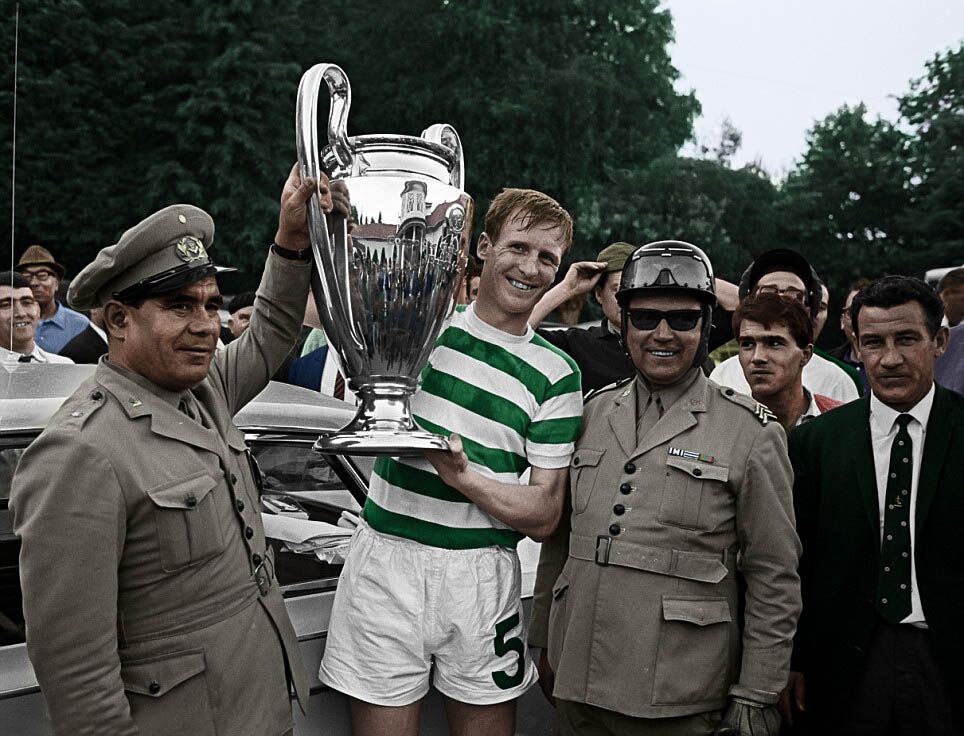

His courage in battling the Motor Nuerone Disease that eventually took him from us was awesome. He never let his head go down. Not once. How do you cope with something like that? The wee man actually realised there was something wrong back in November, 2001. He turned up with Bertie Auld at the funeral of my father and Bertie remembers wee Jinky telling him that day that all was not well. He probably revealed it in that matter-of-fact manner of his and I know he was convinced he could overcome the illness. Sadly, it was one battle even the wee man couldn’t win. Let’s not get weepy, though, Jinky wouldn’t have wanted that. Let’s just offer up a special thanks for all the wonderful memories he left with us. Quite rightly, he was voted the Greatest-Ever Celtic player a few years ago. There may have been many worthy candidates for the award from the supporters, but I didn’t hear one dissenting voice when the accolade went to Jimmy Johnstone. That tells you everything.
I’ve already said the wee man had a wicked sense of humour, but Ronnie Simpson could be quite funny, too. He was fairly droll and could make the odd caustic comment when he thought it was required. I remember one day when I mishit a passback and Ronnie, in fact, had to make a very smart save. Those were the days when you could actually pass the ball back to your goalkeeper to pick it up without being penalised. On this occasion, though, I got a bit too much oomph behind my pass and Ronnie had to look alert. I expected a rollicking, but it didn’t come. However, as I was lining up on the goal-line to defend a corner-kick I heard Ronnie growling: “Cairney, if you want to score a bloody goal, will you please do it at the other bloody end!” Point taken.
Neilly Mochan, our trainer, was nicknamed Smiler because of the way his face used to light up when he scored a goal during his playing days at Celtic. Neilly had a ferocious shot on him and could thump the ball past keepers from all sorts of ranges and angles. He wasn’t smiling, though, on the afternoon of the European Cup Final. I was in my room, trying to get some rest, when the door opened and there was Neilly, scowling and very definitely not smiling. “Cairney, you’re a real nuisance,” he said. “Oh, what have I done now?” I asked. Neilly answered: “We have just signed a deal with Adidas for the match and you are the only one who wears Puma boots. Now I have got to take your boots, paint out the white flash with black paint and then put in three stripes!” As the match wore on, I could see the white stripes slowly disappearing and the white flash showing through. Thankfully, no-one at Adidas noticed and we got our money!
Of course, I have many memories of that European expedition, but not all of them were happy. I recall feeling just a little bit ropey after our 0-0 draw with Dukla Prague in the Czechoslovakian capital that earned us a 3-1 aggregate win and a place in the Lisbon final. I should have been celebrating with the rest of the troops, but I felt awful. I had not been feeling good all day, although I was able to play against the Czechs without any great problem. Soon after, though, my temperature started to fluctuate – cold one minute, hot the next. By the time I took my seat on the plane, all my joints were sore. I was kept away from the rest of the players as much as possible and, on arrival in Glasgow, was whisked home and went straight to bed. To say I was worried would be an understatement. I was desperate to play in our next game which was only four days away – a little matter of the Scottish Cup Final against Aberdeen at Hampden. Thankfully, though, the bug disappeared as swiftly as it arrived and I was able to turn out against the Dons. Willie Wallace scored two fine goals to give us a 2-0 victory and the silverware. We were still waiting to clinch the league title – which we managed by drawing with Rangers 2-2 at Ibrox a week later – so it was a matter of three down, the Scottish Cup, League Cup and Glasgow Cup, and two to go as we chased a clean sweep.
Of course, we brought the curtain down on a wonderful season with the triumph over Inter Milan. I’ll always remember both teams lining up to go out before the game. Bertie Auld started belting out the Celtic song and we all joined in, giving it pelters. It was a surreal moment, no doubt about it. There were rather gallus Glaswegians on one side, bronzed, smooth, but clearly startled, Italians on the other. I’m sure they thought we were all off our heads. This was no way to act before a European Cup Final, surely. I’m pretty certain it’s not the way Real Madrid or Benfica acted before they played Inter Milan in the finals of 1964 and 1965. The Italians won both those games, but our off-key singing must have unsettled them. It certainly showed them we were not afraid.
After the match it was pure pandemonium – and a bit disappointing. The fans’ fervour boiled over at the end and thousands raced onto the pitch to applaud their heroes. I lost shirt, boots and socks to supporters, eventually reaching the dressing room, firmly holding onto my shorts and jock strap. Those Celtic fans were always there when needed. They got solidly behind the team whenever we were down and were often regarded as our extra man. However, with the supporters swarming all over the place, it meant we could not be awarded the trophy on the pitch. Goodness knows where the most prized trophy in European football may have ended up. On top of a cupboard in a Glasgow flat possibly!
It would have been wonderful for the players to have been awarded the European Cup and been allowed to take a lap of honour, not just for the fans present in Lisbon, but for the many thousands watching on television throughout Europe. The presentation of our medals was also anti-climactic, to say the least. At the banquet following the game an official came up and placed two containers of medals on our table. We more or less helped ourselves to them. It was a rather strange end to such a fantastic, unforgettable day.
But, hey, we were the champions of Europe and, at the end of the day, that was all that mattered.
*Thanks to Alex Gordon for permission to use this chapter for his book on the Lisbon Lions which was published on the 40th Anniversary of Celtic winning the European Cup.

